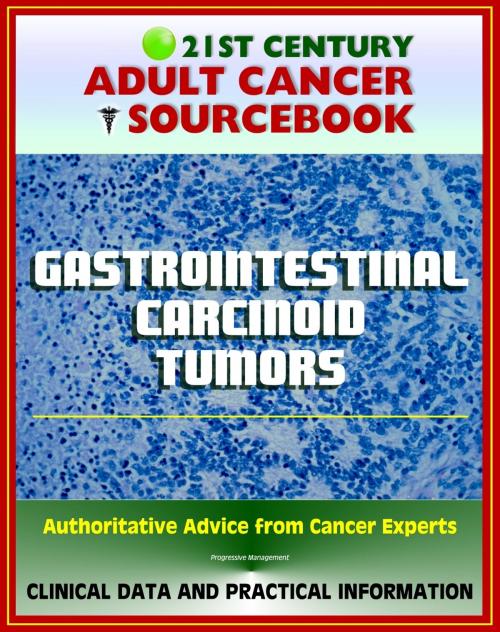21st Century Adult Cancer Sourcebook: Gastrointestinal Carcinoid Tumors - Appendix, Rectal, Small Bowel, Gastric, Colon, Pancreatic, Regional, Metastatic, Carcinoid Syndrome
Nonfiction, Health & Well Being, Health, Ailments & Diseases, Cancer, Medical| Author: | Progressive Management | ISBN: | 9781466151727 |
| Publisher: | Progressive Management | Publication: | September 26, 2011 |
| Imprint: | Smashwords Edition | Language: | English |
| Author: | Progressive Management |
| ISBN: | 9781466151727 |
| Publisher: | Progressive Management |
| Publication: | September 26, 2011 |
| Imprint: | Smashwords Edition |
| Language: | English |
Authoritative information and practical advice from the nation's cancer experts about gastrointestinal carcinoid tumors includes official medical data on signs, symptoms, treatment options, surgery, radiation, drugs, chemotherapy, staging, biology, prognosis, and survival, with a complete glossary of technical medical terms and current references. Starting with the basics, and advancing to detailed patient-oriented and physician-quality information, this comprehensive in-depth compilation gives empowered patients, families, caregivers, nurses, and physicians the knowledge they need to understand the diagnosis and treatment of gastrointestinal carcinoid..
Comprehensive data on clinical trials related to gastrointestinal carcinoids is included - with information on intervention, sponsor, gender, age group, trial phase, number of enrolled patients, funding source, study type, study design, NCT identification number and other IDs, first received date, start date, completion date, primary completion date, last updated date, last verified date, associated acronym, and outcome measures.
A gastrointestinal carcinoid tumor is cancer that forms in the lining of the gastrointestinal tract. The gastrointestinal tract includes the stomach, small intestine, and large intestine. These organs are part of the digestive system, which processes nutrients (vitamins, minerals, carbohydrates, fats, proteins, and water) in foods that are eaten and helps pass waste material out of the body. Gastrointestinal carcinoid tumors develop from a certain type of hormone -making cell in the lining of the gastrointestinal tract. These cells produce hormones that help regulate digestive juices and the muscles used in moving food through the stomach and intestines. A gastrointestinal carcinoid tumor may also produce hormones. Carcinoid tumors that start in the rectum (the last several inches of the large intestine) usually do not produce hormones. Gastrointestinal carcinoid tumors grow slowly. Most of them occur in the appendix (an organ attached to the large intestine), small intestine, and rectum. It is common for more than one tumor to develop in the small intestine. Having a carcinoid tumor increases a person's chance of getting other cancers in the digestive system, either at the same time or later.
Extensive supplements, with chapters gathered from our Cancer Toolkit series and other reports, cover a broad range of cancer topics useful to cancer patients. This edition includes our exclusive Guide to Leading Medical Websites with updated links to 81 of the best sites for medical information, which let you quickly check for updates from the government and the best commercial portals, news sites, reference/textbook/non-commercial portals, and health organizations. Supplemental coverage includes:
Levels of Evidence for Cancer Treatment Studies
Glossary of Clinical Trial Terms
Clinical Trials Background Information and In-Depth Program
Clinical Trials at NIH
How To Find A Cancer Treatment Trial: A Ten-Step Guide
Taking Part in Cancer Treatment Research Studies
Access to Investigational Drugs
Clinical Trials Conducted by the National Cancer Institute's Center for Cancer Research at the National Institutes of Health Clinical Center
Taking Time: Support for People with Cancer
Facing Forward - Life After Cancer Treatment
Chemotherapy and You
This is a privately authored news service and educational publication of Progressive Management. For over a quarter of a century, our news, educational, technical, scientific, and medical publications have made unique and valuable references accessible to all people. Our e-books put knowledge at your fingertips, and an expert in your pocket!
Authoritative information and practical advice from the nation's cancer experts about gastrointestinal carcinoid tumors includes official medical data on signs, symptoms, treatment options, surgery, radiation, drugs, chemotherapy, staging, biology, prognosis, and survival, with a complete glossary of technical medical terms and current references. Starting with the basics, and advancing to detailed patient-oriented and physician-quality information, this comprehensive in-depth compilation gives empowered patients, families, caregivers, nurses, and physicians the knowledge they need to understand the diagnosis and treatment of gastrointestinal carcinoid..
Comprehensive data on clinical trials related to gastrointestinal carcinoids is included - with information on intervention, sponsor, gender, age group, trial phase, number of enrolled patients, funding source, study type, study design, NCT identification number and other IDs, first received date, start date, completion date, primary completion date, last updated date, last verified date, associated acronym, and outcome measures.
A gastrointestinal carcinoid tumor is cancer that forms in the lining of the gastrointestinal tract. The gastrointestinal tract includes the stomach, small intestine, and large intestine. These organs are part of the digestive system, which processes nutrients (vitamins, minerals, carbohydrates, fats, proteins, and water) in foods that are eaten and helps pass waste material out of the body. Gastrointestinal carcinoid tumors develop from a certain type of hormone -making cell in the lining of the gastrointestinal tract. These cells produce hormones that help regulate digestive juices and the muscles used in moving food through the stomach and intestines. A gastrointestinal carcinoid tumor may also produce hormones. Carcinoid tumors that start in the rectum (the last several inches of the large intestine) usually do not produce hormones. Gastrointestinal carcinoid tumors grow slowly. Most of them occur in the appendix (an organ attached to the large intestine), small intestine, and rectum. It is common for more than one tumor to develop in the small intestine. Having a carcinoid tumor increases a person's chance of getting other cancers in the digestive system, either at the same time or later.
Extensive supplements, with chapters gathered from our Cancer Toolkit series and other reports, cover a broad range of cancer topics useful to cancer patients. This edition includes our exclusive Guide to Leading Medical Websites with updated links to 81 of the best sites for medical information, which let you quickly check for updates from the government and the best commercial portals, news sites, reference/textbook/non-commercial portals, and health organizations. Supplemental coverage includes:
Levels of Evidence for Cancer Treatment Studies
Glossary of Clinical Trial Terms
Clinical Trials Background Information and In-Depth Program
Clinical Trials at NIH
How To Find A Cancer Treatment Trial: A Ten-Step Guide
Taking Part in Cancer Treatment Research Studies
Access to Investigational Drugs
Clinical Trials Conducted by the National Cancer Institute's Center for Cancer Research at the National Institutes of Health Clinical Center
Taking Time: Support for People with Cancer
Facing Forward - Life After Cancer Treatment
Chemotherapy and You
This is a privately authored news service and educational publication of Progressive Management. For over a quarter of a century, our news, educational, technical, scientific, and medical publications have made unique and valuable references accessible to all people. Our e-books put knowledge at your fingertips, and an expert in your pocket!















